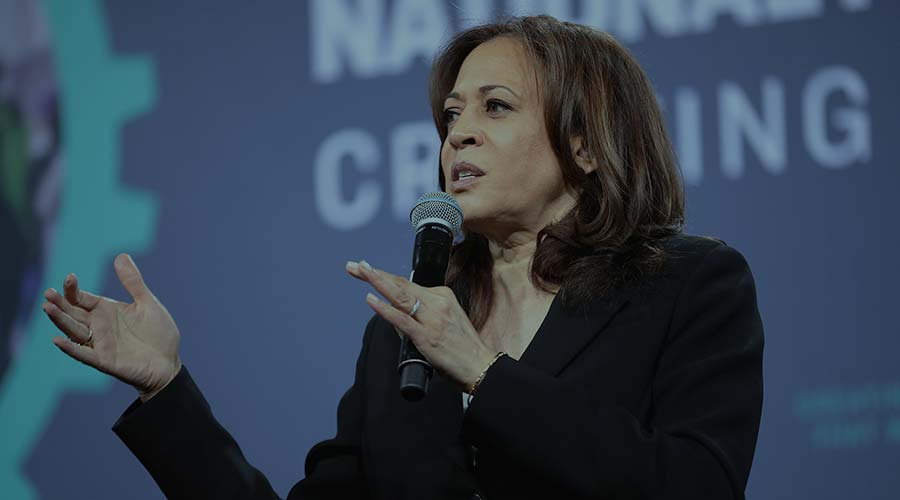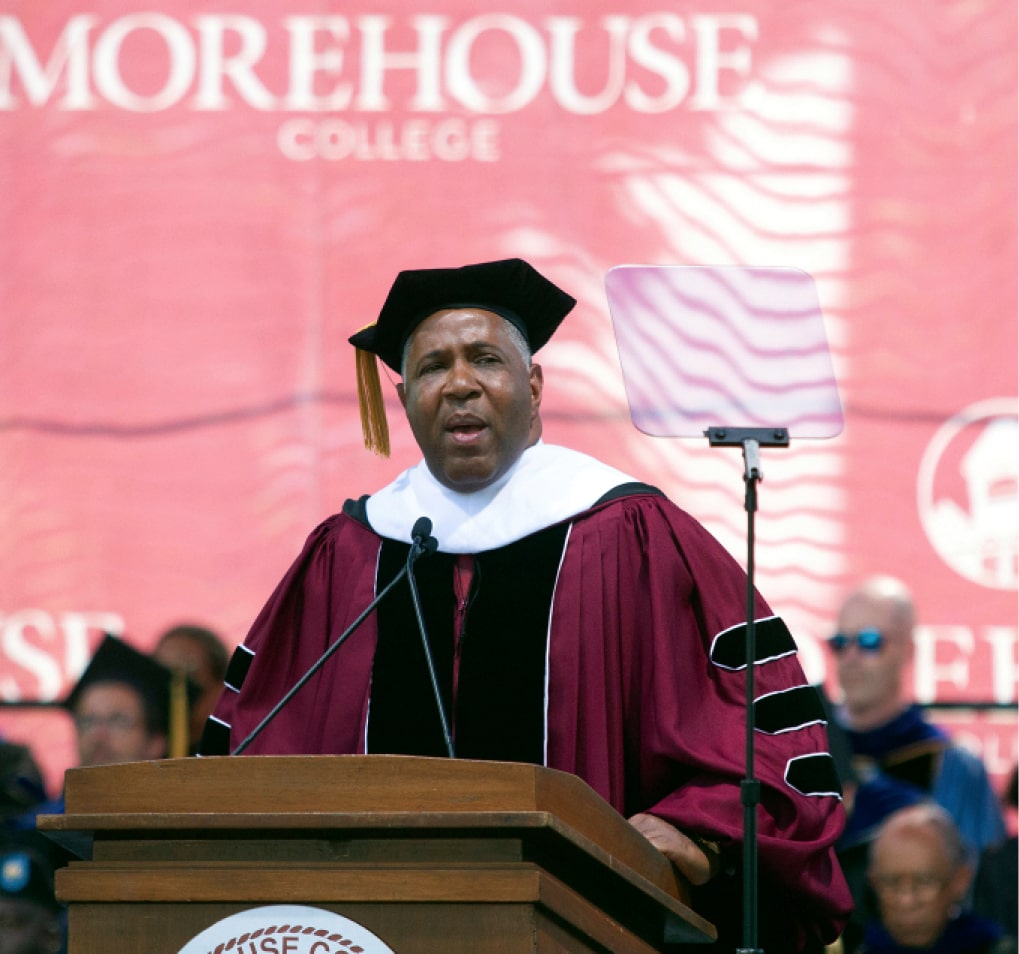Chris Paul Tulane Public Relations, CC BY 2.0, via Wikimedia Commons
2021 was a historic year for the U.S. — we continued working through the global health and economic crisis, swore in the first woman and the first person of color to be Vice President, and 50 women of color were elected into Congress with over 600 elected to state offices. As the year comes to a close, it’s important to give recognition to the leaders who brought our country forward, particularly for the African American community.
1. Kamala Harris Becomes the First Woman and First Person of Color to Serve as Vice President of the United States
We cannot highlight Black leaders of 2021 without mentioning the historic moment on January 20th when America swore in its first female, first person of color and first graduate of a Historically Black College and University (HBCU) as Vice President of the United States, Kamala Harris.
Harris was born in California in 1964 to two immigrant parents from India and Jamaica. She graduated from Howard University, one of the country’s most prestigious HBCUs, in 1986 with a degree in political science and economics, then pursued law school at University of California, Hastings College of the Law. After receiving her law degree, she went on to become the district attorney’s top prosecutor in San Francisco, California in 2003 “before being elected the first female and the first African American to serve as California’s attorney general, the top lawyer and law enforcement official in America’s most populous state.” After a successful career as a district attorney, Harris joined the United States Senate in 2017 to represent Californians on the national stage.
Harris announced her campaign for the Democratic nomination for President of the United States in January 2019 at her alma-mater Howard University. When asked about why she chose the HBCU to give the announcement, she said, “it is because Howard University is one of the most important aspects of my life. It is where I ran for my first elected office, which was freshman class representative of the liberal arts student council at Howard University. So, this is where it all began.”
Today, President Joe Biden and Vice President Harris serve together in the highest elected offices in the country. In Harris’ speeches, she often quotes her mother to offer encouraging words to the public: “You may be the first to do many things, but make sure you are not the last.”
Robert F. Smith is passionate about encouraging the African American community to vote, and helped the Be Woke.Vote movement arrange numerous events to get underrepresented communities to the polls during the election of 2020. After Harris was elected, Smith released an article about how her groundbreaking victory is an example of the lasting value of an HBCU education.

2. Chris Paul Launches the “HBCU Tip-Off” to Shine a Light on Historically Black Colleges and Universities
Another champion of HBCUs that blazed new trails this year is NBA star, Chris Paul. The Phoenix Suns player has been a massive supporter of HBCUs over the years. According to HBCU GameDay, Paul launched “HBCU voting initiatives to encourage students to vote during the past election and partnered with Sour Patch Kids and the Thurgood Marshall College Fund to create The Mischief for Change Scholarship, a college scholarship fund with a $1 million commitment over the next five years for students attending HBCUs.”
To prove the importance and value of a college degree, at 35 years old in 2020, Paul enrolled at Winston-Salem State University — a North Carolina-based HBCU — to continue his education and receive a bachelor degree in Communications because he had left college early to join the NBA.
In partnership with the Basketball Hall of Fame, Paul decided to shine a light on HBCUs by launching a new college basketball tournament, the “Chris Paul HBCU Tip-Off,” which was held for the first time in November. Teams from Morehouse College, Virginia Union, West Virginia State and Winston-Salem State participated in the televised event in the Mohegan Sun Arena.
John L. Doleva, President and CEO of the Basketball Hall of Fame, said in a statement about the event: “Chris Paul has shown unwavering support for HBCUs and brought an awareness to creating opportunities for the student-athletes at these institutions.”
Paul is also an investor in a banking app, GoalSetter, with Vista Equity Partners Chairman and CEO, Robert F. Smith. Paul helped GoalSetter launch its first Black History Month campaign in February 2021 to help minorities learn how to save money. Smith is a strong believer that HBCUs help develop leaders, so he helped launch the Student Freedom Initiative (SFI), an organization focused on eliminating debt for STEM students at HBCUs to help allow students at minority serving institutions to succeed.
3. Dr. Kizzmekia Corbett was the Lead Scientist on Vaccine Development
The COVID-19 vaccine was quickly and effectively developed in less than one year, and that’s thanks to the tireless efforts of the scientists who rapidly responded to the international emergency. One of the leaders to note for this success is Dr. Kizzmekia Corbett, the lead scientist on the Moderna vaccine.
The global health crisis disproportionately affected people of color, so many members of the community were hesitant to take the vaccine. In a December 2020 speech, Dr. Anthony Fauci addressed the concerns of the African American community, and urged the country to trust the safety of it.
“So, the first thing you might want to say to my African American brothers and sisters is that the vaccine that you’re going to be taking was developed by an African American woman,” said Fauci.
Dr. Kizzmekia Corbett led the development of the vaccine at only 35-years old. Corbett has had a passion for science from a young age. She had six years of experience studying similar viruses such as SARS and MERS, which qualified her to lead her team. In a 2021 interview with Nature, Corbett notes that she was also a double major in sociology, so she understands “the intricate interlacing of science and health, particularly for disparities, and particularly for people of colour.”
“I could never sleep at night if I developed anything — if any product of my science came out — and it did not equally benefit the people that look like me. Period.” – Immunologist Dr. Kizzmekia Corbett
4. Renee Montgomery Becomes Majority Owner of WNBA Atlanta Dream
WNBA champion Renee Montgomery retired her successful 11-year basketball career with the Atlanta Dream in 2020 to focus on activism full-time in the wake of the murder of George Floyd and nationwide protests for racial justice. She made the life-changing decision despite her love for the sport and not knowing where her next paycheck might come from because she believed there was much more she could do for her community off the court.
“I wanted to do more and more, and then I felt like, how could I do more if I was half in and half out? And so I made a decision to just be all in,” Montgomery told the public in 2020.
In February 2021, Atlanta Dream co-owners at the time, former U.S. Senator Kelly Loeffler and Mary Brock, were pressured to step down from their roles in the WNBA, after coming out against the WNBA’s racial justice initiatives. The team was sold to Montgomery in partnership with majority owner Real estate investor Larry Gottesdiener and Suzanne Abair, president of Massachusetts-based Northland Investment Corp.
Montgomery is still continuing her activist work even as the new co-owner of Atlanta Dream, and has made other career moves over the past year such as co-hosting the “Takeline” podcast with Jason Concepcion.
“What’s next is not letting what happened in 2020 just be that little moment. It needs to be a movement now,” said Montomery. “Let’s continue what we started. I’m very optimistic.”
5. Reverend Raphael Warnock Elected As the First African American Senator in Georgia History
The moment that Reverend Raphael Warnock replaced Kelly Loeffler in her U.S. Senate seat was historic because he is also the first African American senator in Georgia history and only the eleventh Black senator in U.S. history.
Warnock is native to Georgia and is the pastor of the same church Martin Luther King Jr. was pastor of, Ebenezer Baptist Church. In his campaign announcement video, he said, “some might ask why a pastor thinks he should serve in the Senate. Well, I’ve committed my whole life to service and helping people realize their highest potential. I’ve always thought that my impact doesn’t stop at the church door. That’s actually where it starts.”
Warnock’s victory is a testament to the power of the Black community and the Black church when it comes to politics.
Warnock also attended the same school that Martin Luther King Jr. studied at, the HBCU Morehouse College, which is also the same school that Robert F. Smith made a $34 million donation to relieve the student loan debt for its entire graduating class of 2019.
Other Black and African American leaders to watch in 2022, include more of the last year’s headline makers:
- Stacey Abrams, who recently announced her candidacy for the Governor of Georgia
- Amanda Gorman, the youngest inaugural poet who dreams of writing novels
- Rashida Jones, president of MSNBC and first Black executive to run a major television news network
- Cori Bush, the first Black congresswoman in Missouri
- Noah Harris, the first Black man to be elected student body president at Harvard University
- Sydney Barber, U.S. Naval Academy’s first Black female brigade commander
- Nia DaCosta, the first Black woman to direct a Marvel film
- Jason Wright, the first Black president in NFL history
Follow Robert F. Smith on Instagram, Twitter and Facebook to keep up with everything going on with Black leaders in 2022, and beyond.







